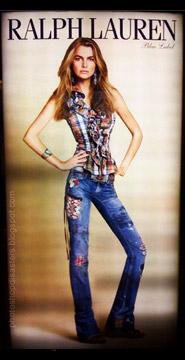
A model who featured in a fashion photograph for Polo Ralph Lauren, which was doctored to make her look abnormally thin, has been dropped by the clothing label, she says, for being too fat.
In the latest row over distorted body images in the fashion industry, Filippa Hamilton said yesterday that her contract with the luxury brand had been terminated after six years because she was too heavy.
“They fired me because they said I was overweight and couldn’t fit in their clothes any more,” she said. The company disputes her claim.
The 5ft 10in (1.79m) and 8½st (54kg) model who is a US size 4 (a UK size 8), found herself at the centre of a controversy after a digitally altered photograph of her appeared in a Ralph Lauren advertisement in Japan. In the image, which spread quickly via the internet last week, her waist had been reduced to almost the width of her head.
Critics said that the retouched image could be seen as realistic and so influence consumers, particularly the young, and encourage eating disorders or the kind of Tic-Tac-and-cigarette diet favoured by some models.
Hamilton, 23, was incensed that her image had been digitally retouched. “I was shocked to see that super-skinny girl with my face. It’s very sad, I think, that Ralph Lauren could do something like that,” she said.
Polo Ralph Lauren attempted to limit the damage, agreeing that the image should never have been used. “The image in question was mistakenly released and used in a department store in Japan and was not the approved image which ran in the US,” it said.
“We take full responsibility for allowing this image to run as this is completely inconsistent with our creative standards and brand values. This error has absolutely no connection to our relationship with Filippa Hamilton.”
But the company also confirmed that it had ended its relationship with Hamilton “as a result of her inability to meet the obligations under her contract”. A spokesman said: “Filippa Hamilton is a beautiful and healthy woman that we have worked closely with for over six years and we consider her an important part of our imaging and branding. We regret that our relationship has ended.”
He denied that she had been dropped for being overweight, but Geoffrey Menin, Hamilton’s lawyer, said she had been let go because the company said that she did not fit into the sample sizes that it needed her to wear for photoshoots.
“That photoshopped image pushed all this into the open. That image was a gross distortion of what she really looks like and was professionally and emotionally harmful to her.
“From a professional point of view, nobody would want to hire somebody looking like that. She was angry too. She had felt that Ralph Lauren was like a family to her as she had worked with them since she was 15,” Mr Menin said.
The debate over the responsibility of the fashion industry for disseminating images of unrealistically thin women has raged for years.
Earlier this year Alexandra Shulman, Editor of British Vogue, wrote to the world’s main designers expressing her concern that they were, in effect, making magazines hire models with “jutting bones and no breasts or hips” by supplying them with “minuscule” garments for their photoshoots.
Vogue was frequently “retouching” photographs of models to make them look larger, she said.





